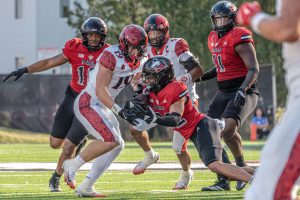Academic misconduct on the rise this year
April 27, 2004
If trends continue, NIU’s Judicial Office may become busy dealing with its biggest problem at semester’s end – academic misconduct.
NIU’s Judicial Director Larry Bolles said this year, NIU has seen more cases of academic misconduct than normal.
As of late last week, Bolles already had documented 143 cases. If the final two weeks of the semester produce as many cases as normal, Bolles said he could be looking at nearly 190.
Many cases could be avoided, Bolles said, if students read their class syllabus. The syllabus contains information that may help with students’ confusion regarding an assignment.
Students accused of academic misconduct often claim they were unclear about an assignment’s rules, but Bolles said that is an unacceptable accuse.
“Students need to know the rules,” Bolles said. “When in doubt, ask. Everyone should assume that whatever paper, project or speech is expected to be original work.”
The increase in academic misconduct cases in recent years can be attributed to a few things-mainly technology, Bolles said.
The Internet makes it easier for students to plagiarize papers, Bolles said. What many don’t realize, he added, is it is the easiest way to get caught.
Michael Day, director of first-year composition classes in NIU’s English department, agreed.
“I’m surprised that so many people plagiarize from the Web when they know how easy it is for a professor to use Google or another search engine to detect it,” Day said.
The most prevalent of all Web-assisted plagiarism cases Day sees is where a student copies and pastes text from a Web site without attributing it.
“We do explain plagiarism,” Day said. “Students know what it is.”
Many cases of academic misconduct result when computer programs are reproduced.
Students in computer science, business and engineering classes often have to write computer programs. The programs often are difficult and time consuming, so students try to take shortcuts, Bolles said. Shortcuts include using parts of or the entire program of another student.
Rodney Angotti, chair of the department of computer science, said what many students do not realize is professors who assign the programs know the solutions well. When students use parts of another student’s program, it’s easy to detect.
“Programs are an expression of self,” Angotti said. “It’s like two English papers being the same.”
Besides, Angotti said, the professors who set up the programs know all the cheating tricks.
Students who are accused of academic misconduct face a number of penalties. Depending on severity and frequency, a student may be expelled or suspended from the university, Bolles said. At the least, he or she would receive a failing grade on the assignment or in the class.
It is rare, Bolles said, for a misconduct case to be overturned by the judicial office. And yes, he added, it could affect graduation plans.
“[Academic misconduct is] not limited to underclassmen,” Bolles said. “This time of year, I see it everywhere. Ignorance [of the rules] is no excuse. You need to know the rules.”






